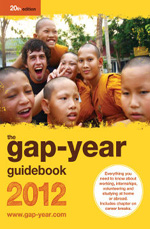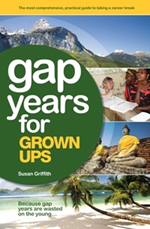Gap Years

What is a gap year?
‘Gap Year’ is a term used in Britain to describe time taken off from formal education. Traditionally, students choose to take their gap years between secondary school and university, but in recent years many have undertaken gap years between their undergraduate and postgraduate degrees, or before entering the workforce.
Gap years can involve anything from working your way around the world, to adventure travel, volunteer placements, or undertaking an internship with a specific organisation. Ultimately it is up to each student to decide how they are going to structure their time to make the most of their experience.
Are there any gap years directly linked to anthropology?
If you are taking a gap year before you start university, it can be difficult to find activities directly linked to anthropology. However, because anthropology is such a vast subject with an increasing number of specialist areas (such as environmental anthropology, anthropology of development or anthropology of childhood), there are numerous ways you can make your gap year experience relevant to your interest in studying the discipline. Before researching gap year options, it may be helpful to look at the specialist areas and careers pages to gain a greater understanding of the range of options that exist within anthropology.
If you are interested in short-term options such as volunteering at a museum, doing an internship at an anthropological institution, or undertaking an archaeological dig, then look at our internship/volunteering page for more information.
Will a gap year affect my application to study anthropology at university?
Most universities will have their own particular view on students wishing to take a gap year. In general, anthropology departments in the UK look favourably upon gap year experiences as long as students are able to explain clearly how they will spend their time and how the experience will benefit them on a personal and academic level. Students are advised to check with individual departments and talk to academic advisors about requirements and procedures for deferred entry.
Useful resources on gap years:
The following gap year film was produced by the University of Birmingham. The film provides a good overview of the advantages of taking an informed gap year and what academics think of students' experiences in regards to university applications.
http://www.gapyear.com/- provides different types of gap years, income ranges and useful information on which gap years best serve individual interests and needs.
http://www.gapyeardirectory.co.uk/ - provides information on choosing a gap year programme to suit individual needs and interests.
http://www.prospects.ac.uk/ - Prospects provides information on funding, choosing and planning a gap year and links to resources and case studies.
Further reading:



Get involved in anthropology through the RAI's Education Outreach Programme
 The RAI's Education Department organises events, activities, contests as well as produces teaching and learning materials for anyone interested in learning about anthropology. Take a look at the many ways to get involved with like-minded people who are passionate about the subject:
The RAI's Education Department organises events, activities, contests as well as produces teaching and learning materials for anyone interested in learning about anthropology. Take a look at the many ways to get involved with like-minded people who are passionate about the subject:
- Become an RAI member: take a look here for all the benefits associated with joining the RAI.
- Attend an event: take a look at our events page for a list of various anthropological events which take place nationally.
- Take part in discussions by joining us on Twitter @DiscoverAnthro and our Facebook Group
- Become a volunteer: the RAI's Education Department is always looking for enthusiastic individuals to help out with our outreach events such as the London Anthropology Day and the RAI Anthropology, Weather and Climate Change Conference 2016. If you are interested in volunteering email the RAI's This email address is being protected from spambots. You need JavaScript enabled to view it..
- Apply for an internship: interns form an essential part of the RAI's Educational Outreach Activities. A minimum of two months is required in order to be considered. For further information about internships at the RAI please visit the getting involved page.
- Be creative: If you have a poem, song, artwork or photographs which reflect anthropological topics, email the RAI's This email address is being protected from spambots. You need JavaScript enabled to view it..
Disclaimer: The RAI accepts no responsibility for material created by external parties or the content of external websites.

